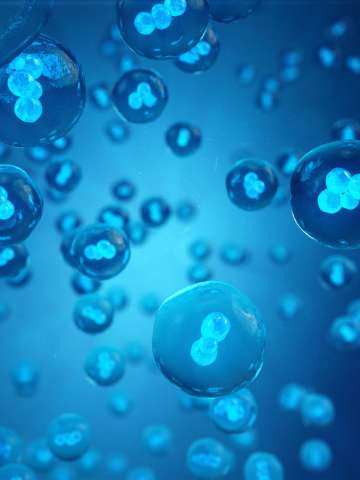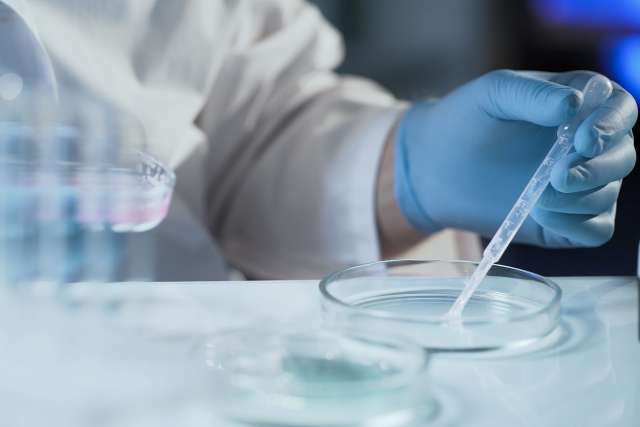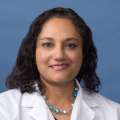Reproductive Genetics
Our reproductive geneticists offer prenatal screening, genetic testing and counseling for couples and fetuses with medical genetic concerns. We provide you with guidance and support so you can make informed decisions.

Why choose the UCLA Health Reproductive Genetics Program?
UCLA Health reproductive geneticists help future parents assess the risk of passing an inherited condition to their child. During a pregnancy, we utilize advanced diagnostic approaches to identify genetic disorders that cause congenital abnormalities (birth defects) and a range of medical conditions. Whether you want to start a family or you’re already pregnant, you can rely on UCLA Health to offer vital information, guidance and support.
Highlights of our program include:
Multispecialty team: You and your baby receive expert care from a dedicated team of specialists. Medical geneticists, anatomic and molecular pathologists and prenatal imaging experts come together with maternal-fetal medicine specialists to deliver the most appropriate diagnosis. We work closely with cardiologists, neonatologists and pediatric surgeons to ensure coordinated care while supporting you and your family. In addition, we provide extensive services to women who are affected by a genetic condition.
Compassionate counseling services: Our knowledgeable team provides preconception genetic counseling for people with a personal or family history of genetic disorders. We also work with expecting parents whose baby has received a diagnosis before birth. Our goal is to answer your questions, discuss treatment options and offer you information and guidance.
Leading-edge diagnostics: UCLA Health is known for pioneering sophisticated testing procedures for genetic disorders. We use groundbreaking technology to care for our patients. Using this information, we partner with you to determine the best plan for you and your baby. By diagnosing conditions early, we’re able to develop the best care plan for your needs.
Expert care on delivery day: You can trust UCLA Health to provide outstanding care to you and your baby before, during and after delivery. If your newborn needs a higher level of care, our neonatal intensive care units (NICUs) are ranked among the top in the nation. At the UCLA Health Fetal Care Center, pediatric specialists can deliver treatment right after a baby is born. We’re prepared to treat even the most complex conditions quickly and efficiently. Learn more about the UCLA Health Fetal Care Center.
Advanced expertise: If you have a baby with a genetic disorder, you’ll have the resources and support of a top medical center behind you. Our team works closely with UCLA Health experts in genetics to help newly diagnosed children and their families manage a range of disorders. We’re by your side as your baby grows up, offering therapies, support and comprehensive care. Learn more about UCLA Health pediatric genetics.
Our areas of care
UCLA Health reproductive geneticists deliver information and guidance throughout your journey. We work as a team to provide you with compassionate care and expert advice at every step, from pre-pregnancy consultations to postpartum support. Our team specializes in:
Genetic counseling
If you’re pregnant or planning to have a baby, we meet with you to review your health and your family’s medical history. If you or your partner has a known genetic disorder, we help you assess the risk of passing the disorder to your child. We work with you to determine the genetic screening and testing procedures that can guide your reproductive decisions.
You may benefit from genetic counseling if you:
- Are 35 or older
- Are seeking information about genetic testing options
- Have a genetic disorder or a family history of a genetic condition
- Have experienced multiple miscarriages
- Have dealt with infertility
- Received abnormal results from a prenatal ultrasound or blood test
- Were exposed to certain medications or had certain infections during pregnancy
Genetic screening
The goal of genetic screening is to identify potential issues during pregnancy. These screenings indicate whether a baby has an increased risk of being born with a genetic disorder or congenital abnormality. Screenings may include:
Carrier screening: This DNA test tells parents if they carry a gene that can cause a congenital disorder. The test can be performed before or during pregnancy.
Cell-free DNA screening (also called noninvasive prenatal testing or NIPT): This blood test (using blood taken from the mother only) evaluates the chance of the baby having a chromosomal abnormality, notably for Down syndrome.
First trimester blood test and nuchal translucency ultrasound: A combination of a blood test and ultrasound, this test indicates whether you’re at an increased chance of having a baby with Down syndrome or another genetic disorder.
Multiple marker screening (MMS): The MMS includes several tests using blood from the mother. The tests particularly detect signs of neural tube defects and some other congenital abnormalities.
Sequential screening: This procedure involves two blood tests and an ultrasound. It assesses the risk of neural tube defects (such as spina bifida) and certain genetic abnormalities.
Prenatal diagnostic testing
These tests allow your doctor to diagnose some conditions in an unborn baby. Your doctor may recommend:
Amniocentesis: During this procedure, your doctor uses a needle to remove amniotic fluid from the uterus. A lab examines the fluid to check for chromosomal abnormalities and genetic disorders.
Chorionic villus sampling (CVS): Your doctor takes a small sample of the developing placenta where it attaches to the uterine wall. CVS diagnoses chromosome problems, genetic disorders and some congenital abnormalities.
Fetal echocardiogram: This detailed ultrasound of the unborn baby’s heart shows how the heart is developing and whether it’s working properly.
Second trimester anatomy ultrasound: This imaging study checks for abnormalities in the baby’s anatomy and can identify certain congenital problems.
Umbilical blood cord sampling: Doctors remove blood from the baby’s umbilical cord and test the blood for chromosomal abnormalities.
Sophisticated genetic testing
At UCLA Health, we use groundbreaking technology to evaluate a baby’s DNA so we can diagnose a wide range of disorders with unparalleled precision. Genes are made of DNA, a molecule that forms the building blocks of every living organism. Genetic disorders happen when there is a change (mutation) in one or more genes. This change can be passed down in families or occur suddenly in the womb. Our team can help try to identify the exact gene change that’s responsible for an abnormality, disorder or disease.
We use these details to give expecting parents information about their unborn baby so they can choose the path that’s right for them. After a baby is born, the results of genetic testing provide parents with vital information that helps them have more control over their child’s health. An early and accurate diagnosis allows us to deliver effective care, life-changing therapies and a personalized care plan.
Comprehensive support
At UCLA Health, we know it can be overwhelming to receive a diagnosis, make difficult medical decisions or care for a child with potential special medical needs. That’s why our services include a wide range of counseling and therapy. We meet you where you are with customized support.
We offer tailored educational services, new mom support groups and multiple resources designed to encourage you and your family. You’ll have access to the tools you need to care for your baby while focusing on your own emotional and physical well-being.
Our team partners with UCLA Health neonatology and other specialists to provide you and your family the care you deserve. Whether your little one needs help transitioning out of the NICU, surgery, meeting developmental milestones or receiving care from specialists across UCLA Health, our team is here for you. Learn more about UCLA Health neonatology and developmental biology.
Types of conditions we diagnose
UCLA Health genetics experts have unparalleled expertise diagnosing and evaluating the full range of congenital issues (conditions that appear at birth). Using advanced testing and technology, we specialize in:
Genetic disorders: These include disorders such as Down syndrome, sickle cell anemia and other abnormalities caused by genetic changes (mutations). They can affect any part of the body. These conditions can range from mild to life-threatening.
Conditions affecting a baby’s organs: Prenatal testing can uncover a wide spectrum of heart conditions, lung disease (including cystic fibrosis) and problems with the formation of the baby’s digestive tract.
Congenital abnormalities: Sometimes called birth defects, congenital abnormalities can affect nearly any part of the body. They include limb differences, cleft lip and cleft palate, and clubfoot (a twisted or misshapen foot).
Neural tube defects: These congenital abnormalities happen when the baby’s spine and spinal cord don’t develop properly in the womb. Spina bifida is the most common type of neural tube defect.
Meet our team
Our experienced team includes medical geneticists, specialists in maternal-fetal medicine and laboratory-based cytogeneticists and molecular geneticists who study DNA, run and interpret the diagnostic tests and communicate these findings to the medical team. We work closely with experts in reproductive endocrinology, neonatology, cardiology and pediatric surgery to deliver excellent care to you and your baby.
Division of Maternal Fetal Medicine expert team →
Contact us
Call to connect with the reproductive genetic specialists and team.
Find your care
You receive advanced diagnostics, vital answers and counseling from an expert team. Call to connect with our reproductive genetic experts.




